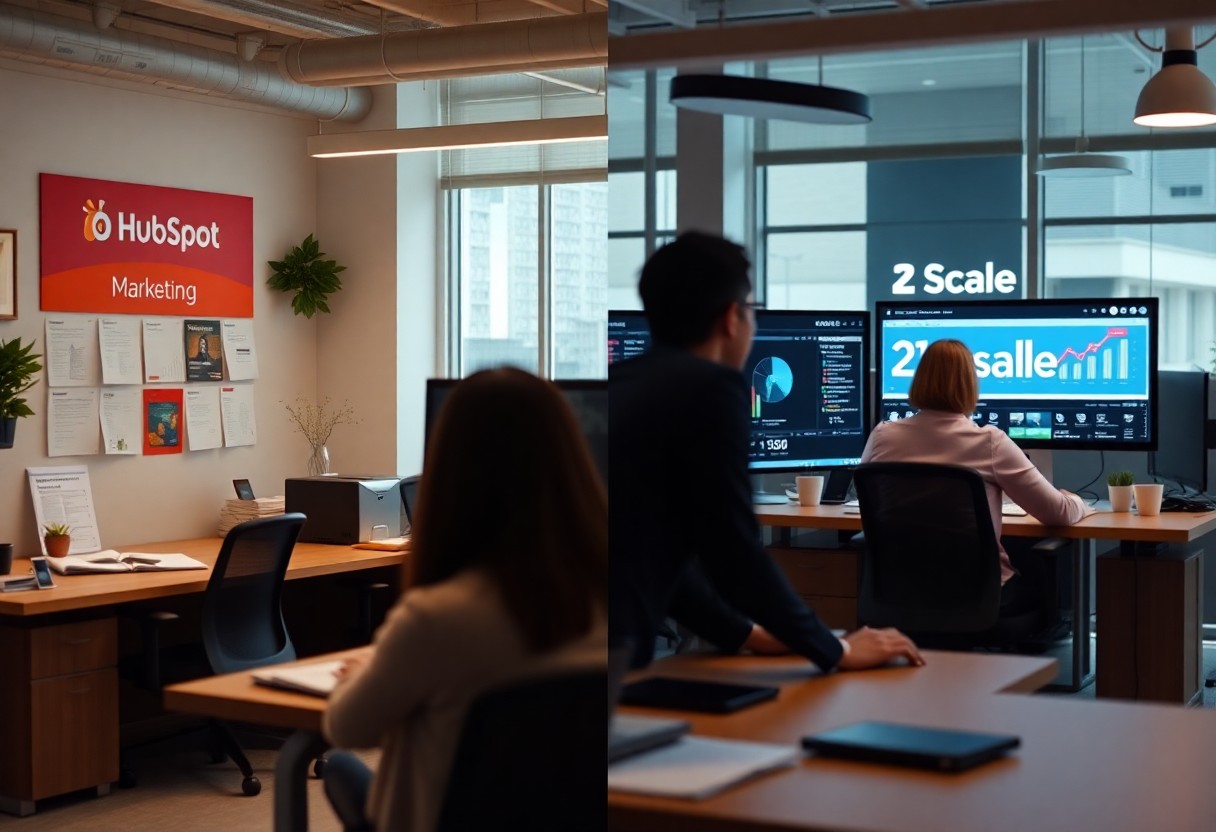
The State of AI Marketing for SMBs – 2025 Mid-Year Statistics.
There’s no denying that AI marketing is fundamentally reshaping the landscape for small and medium-sized businesses (SMBs) in 2025. As an SMB owner, understanding the latest statistics can empower you to harness AI tools effectively, streamline your marketing strategies, and enhance customer engagement. In this blog post, you will discover the key mid-year statistics that illustrate how AI is revolutionizing marketing efforts, allowing you to stay ahead of the competition and make informed decisions about your business’s future.

The Surge of AI Tools: Impact on SMB Marketing Strategies
The rise of AI tools has significantly revolutionized how SMBs approach their marketing strategies. Leveraging machine learning and data analytics allows small businesses to automate tasks that once consumed valuable time and resources. Personalization at scale is no longer an unattainable goal; with AI, you can now identify customer segments and tailor campaigns that resonate with each group, driving engagement and boosting conversion rates more efficiently than ever before.
Adoption Rates of AI Tools Among SMBs
As of mid-2025, approximately 65% of SMBs have adopted at least one AI tool to enhance their marketing efforts, demonstrating a marked increase from just 40% in 2022. This trend signifies a growing recognition among smaller enterprises of the efficiency and competitive advantages that AI solutions offer. Many businesses report a willingness to invest further in AI technology, indicating a shift in mindset as these tools become critical components of marketing strategies.
Key AI Technologies Transforming Marketing
AI technologies like chatbots, predictive analytics, and content generation tools are transforming marketing landscapes for SMBs. By leveraging chatbots for customer service queries, businesses reduce response times, while predictive analytics allows for data-driven decision-making creating more effective marketing forecasts. Content generation tools help tailor messages quickly, ensuring you connect with your audience effectively. Each of these technologies plays a vital role in creating a personalized, efficient marketing approach, allowing SMBs to compete on a larger scale without overextending their resources.
Budgeting for AI: The Financial Shift in SMB Marketing
Embracing AI technologies presents various financial considerations for SMBs. Allocating a budget for AI requires an understanding of current and future marketing needs, alongside an assessment of potential returns. With the right investment, you can leverage AI to enhance customer engagement, streamline operations, and ultimately drive revenue growth.
Comparing Historical Expenditures vs. 2025 Investments
| Year | Average Marketing Budget (%) for AI |
|---|---|
| 2020 | 10% |
| 2023 | 20% |
| 2025 | 35% |
ROI: Measuring Success in AI Marketing Initiatives
Measuring ROI in AI marketing initiatives is vital for understanding your investment’s effectiveness. Data indicates that companies adopting AI-driven marketing strategies have seen an average ROI increase of 18% as of 2025. This rise is directly linked to improved targeting, personalization, and efficiency in campaigns.
Successful SMBs are employing advanced metrics to gauge the success of their AI investments, including customer lifetime value (CLV) and conversion rates. For instance, businesses leveraging AI-driven analytics tools reported a 25% increase in customer retention and a 30% boost in sales efficiency. By continuously analyzing these performance indicators, you can adjust your strategies to maximize returns and align them with your overall business objectives, ensuring that AI investments translate into tangible results.
Consumer Behavior: How AI is Shaping SMB Customer Interaction
As AI technologies become more integrated into marketing strategies, you will notice significant shifts in consumer interactions with your business. Insights derived from AI tools allow you to better understand your customers’ preferences, behaviors, and buying patterns. This data-driven approach enables you to create more meaningful and timely engagements, enhancing customer loyalty and driving revenue. AI is not just about automation; it’s about delivering personalized experiences that resonate with your audience on a deeper level.
Personalization Techniques Driven by AI
AI empowers you to deliver hyper-personalized content to your customers, tailoring messages based on their individual preferences, browsing history, and purchasing behavior. By using algorithms that analyze past interactions, you can engage your audience with relevant offers and product recommendations, significantly improving open rates and conversion levels. This level of personalization not only enhances customer satisfaction but also fosters a sense of brand loyalty.
Customer Journey Mapping with AI Insights
AI provides the tools needed to map out your customer journey more effectively. By analyzing touchpoints and user behavior, you can identify trends and pain points throughout the buying process. This information allows you to make data-driven adjustments to your marketing funnel, ensuring that each stage aligns with customer expectations and encourages conversions.
Moreover, advanced AI analytics can reveal hidden opportunities along the customer journey that you might not have considered. For instance, AI can detect when customers tend to drop off during the purchase process, providing insights on how to optimize those areas and guide them back to conversion. This targeted approach not only improves customer experiences but also drives higher ROI for your marketing efforts. By continuously updating customer journey maps with AI insights, you’re not just reacting to consumer behavior; you’re proactively shaping it for better outcomes.
The Skills Gap: Talent and Training in the AI Landscape
You’ll find that navigating the AI marketing landscape requires not just understanding technologies but also possessing the right skills. A recent survey indicated that over 60% of marketing leaders believe their teams lack necessary AI skills necessary for utilizing data-driven strategies effectively. This skills gap adversely affects the ability of small to medium businesses (SMBs) to compete in an increasingly tech-driven marketplace, highlighting the need for targeted training programs and dedicated resources to close this divide.
Essential Skills for Marketing Teams in 2025
Focusing on your marketing team’s growth, necessary skills in 2025 will include data analysis, AI integration, and content personalization. The ability to interpret complex datasets will enable you to make informed decisions, while understanding AI tools can enhance customer engagement strategies. Additionally, creative thinking remains vital to ensure that your brand voice resonates authentically in an AI-optimized environment.
Growth of Online Training Programs for SMB Professionals
The boom in online training programs tailored for SMB professionals marks a significant change in how skills are acquired in the AI marketing space. Platforms like Coursera and LinkedIn Learning have reported a 75% enrollment increase in courses focused on AI and marketing since 2023. This shift provides you with flexible, affordable options to bolster your team’s capabilities, allowing your business to stay agile and competitive as new technologies emerge.
Many of these online training programs likely include hands-on projects and case studies relevant to real-world scenarios, ensuring that you not only learn theoretical concepts but also gain practical skills. For instance, platforms often collaborate with industry leaders to develop curricula that align with current market trends. As a result, your marketing professionals can familiarize themselves with tools like machine learning algorithms and customer data platforms – ultimately making your organization more adaptable in the face of change.
Rivals in the AI Arena: Who’s Leading the SMB Marketing Charge?
In the fast-paced world of AI marketing, a few key players are setting the standard for small and medium businesses (SMBs). Companies like HubSpot, Salesforce, and Marketo offer powerful AI-integrated platforms that drive innovative marketing strategies tailored for SMBs. As competition intensifies, these leaders are constantly updating their offerings to remain ahead, utilizing advanced analytics and machine learning algorithms to refine customer targeting and personalization tactics.
Case Studies of Successful AI Marketing Implementations
Several SMBs have successfully harnessed AI marketing technologies to boost their performance. Understanding these examples can guide your own strategies.
- Company A: Increased conversion rates by 25% using AI-driven email campaigns that personalized content based on user behavior.
- Company B: Achieved a 40% reduction in customer acquisition costs after implementing an AI chat bot that handled inquiries 24/7, freeing up resources for other marketing initiatives.
- Company C: Reported a 30% uplift in customer engagement through AI-powered social media ads, tailored to individual preferences and demographics.
- Company D: Noticed a 50% increase in website traffic and improved lead quality by leveraging AI tools for SEO optimization tailored to their target audience.
Emerging Competitors and Market Trends
Emerging competitors are entering the AI marketing space rapidly, challenging established players and offering unique solutions. Startups like Drift and Phrasee are gaining traction with hyper-personalization features that adapt messaging to individual customer journeys. Trends indicate a growing preference for AI tools that enhance user experience, such as predictive analytics and voice-activated technologies. Moreover, SMBs are increasingly seeking affordable, accessible AI solutions that can be easily integrated into existing workflows, shaping a landscape rich with opportunities and differentiation.
Summing up
Taking this into account, the 2025 mid-year statistics on AI marketing for SMBs demonstrate that you can harness AI technology to enhance customer engagement and streamline operations. As the landscape evolves, integrating these insights will empower your business to stay competitive. Whether through personalized customer experiences or improved marketing strategies, the data underscores the importance of adapting to the AI-driven changes in your market. By leveraging these advancements, you can maximize your growth potential and efficiently allocate your resources for better results.


